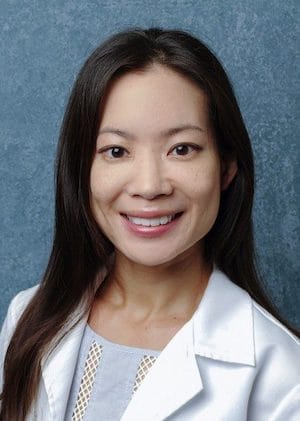Medical oncologist Tiffany Shaw, MD, has joined Cedars-Sinai Cancer as regional medical director for Supportive Care Medicine at Huntington Cancer Center, an affiliate of Cedars-Sinai Cancer.
Shaw’s work at Huntington Cancer Center will expand upon existing supportive care medicine services offered at Cedars-Sinai Cancer. She will also develop programs for hospice, palliative care and end-of-life research.
“The role of supportive care medicine in cancer care has never been more important, and we are thrilled that Dr. Shaw will be expanding these services to our patients,” said Dan Theodorescu, MD, PhD, director of Cedars-Sinai Cancer and the PHASE ONE Distinguished Chair. “We can now deepen our commitment to offering life-extending treatments and improving quality of life through a holistic and team-centric approach based on supportive care medicine principles.”
Shaw first knew that she wanted to become a doctor at age 4, and by the time she entered medical school, she knew oncology was her chosen field. Shaw received her medical degree from the Lewis Katz School of Medicine at Temple University and completed her internal medicine residency at the University of California, Davis, Medical Center.
Her passion for supportive care medicine came during her medical training, after her aunt was diagnosed with recurrent breast cancer that was no longer curable. She went on to serve as a palliative care and hospice fellow at Cedars-Sinai and the VA Greater Los Angeles Healthcare System and completed her hematology/oncology fellowship at Olive View-UCLA Medical Center, serving as chief fellow during her last year.
“My aunt refused to see a palliative care expert, and it made me recognize how little people understood the invaluable role of supportive care medicine and how many misconceptions surround these services,” said Shaw. “I really didn’t want patients to have that same misunderstanding, which led me into this important field.”
Cedars-Sinai Cancer’s longstanding supportive care medicine program brings together specialists in pain and symptom management, who can also help patients and caregivers navigate care goals, make treatment decisions and reduce the side effects of cancer therapies.
Shaw says conversations with her patients range in topic from what exercise programs they can participate in to how their diet will affect their treatment plans, and what supplements they can or cannot take.
“Cancer affects every aspect of a person’s life, so it’s important that we identify goals of care, encourage patients to express their preferences regarding medical treatments, and help to ensure that goals are honored,” said Shaw. “Supportive care medicine allows us to treat the whole person, not just their diagnosis. I’m honored to have these important conversations with my patients and their loved ones.
The Editorial Team at Healthcare Business Today is made up of skilled healthcare writers and experts, led by our managing editor, Daniel Casciato, who has over 25 years of experience in healthcare writing. Since 1998, we have produced compelling and informative content for numerous publications, establishing ourselves as a trusted resource for health and wellness information. We offer readers access to fresh health, medicine, science, and technology developments and the latest in patient news, emphasizing how these developments affect our lives.








